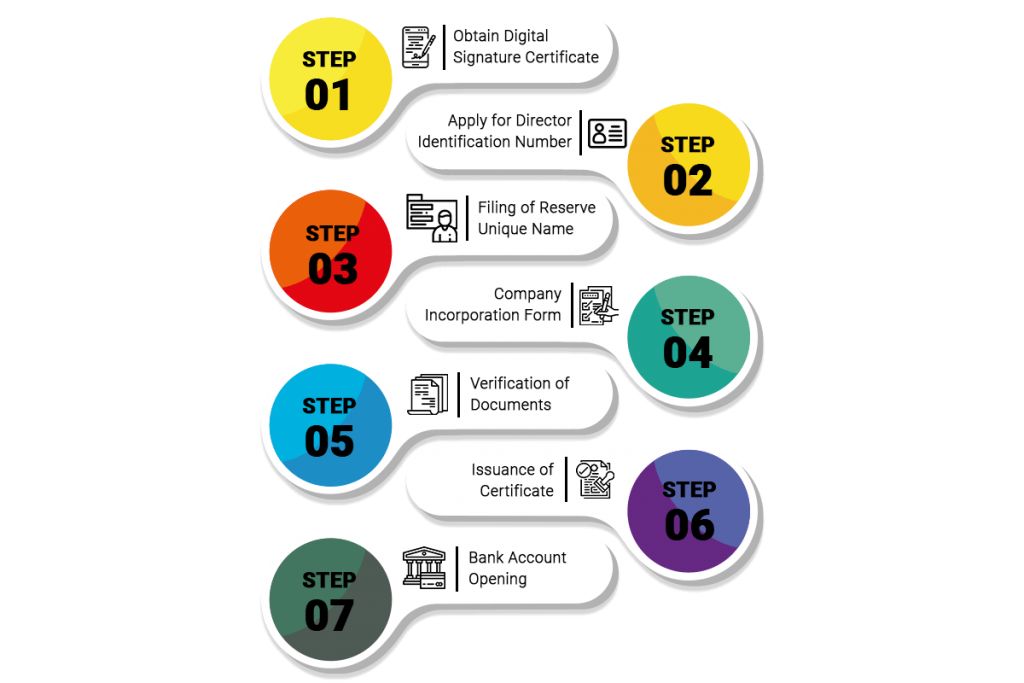What is the Process of Private Limited Company Registration?

Dashmeet Kaur | Updated: Feb 14, 2020 | Category: Private Limited Company
Attaining success in the corporate world is like climbing a mountain. It’s all about the hardships and challenges that one has to overcome to reach the top. Moreover, the difficulty level intensifies if the person is a beginner. Hence, it is essential to lay out a plan and have the right resources. A startup must opt for the business model which is easy to form and has limited liability and is popularly referred as a Private Limited Company. About 95% of business entities are Private Limited Companies in India. It implies that most of the startups are inclined to build such companies as it enables various benefits. Thus, if you also want to undertake the process of Private Limited Company Registration, then this write-up can act as a reference for you.
Table of Contents
Primary features of a Private Limited Company
Here are the key characteristics that define the nature of a Private Limited Company:
- Total number of members– It requires a minimum of 2 members and a maximum number of 200 members as per the provision of Companies Act 2013.
- Perpetual succession– A Private Company has a separate legal entity. Thus, it keeps on existing in the eyes of the law even after death, bankruptcy, or insolvency of any of its members.
- No minimum capital requirement– Earlier, it was mandatory for a Private Limited Company to have a minimum Paid-Up Capital of Rs 1 lakh, but now all the stringent rules related to it has been omitted.
- Limited liability– In a Private Company, the liability of each shareholder or member is limited. Therefore, in case the Company faces any loss under it then the personal assets of the shareholders are not at stake.
- Number of Directors- One must have at least two directors to commence the operations of a Private Company.
- Index of members– A Private Limited Company has the edge over the Public Limited Company as it doesn’t need to maintain an index of its members, unlike the public company.
- Company’s Prospectus– It is a detailed statement of the Company affairs that is issued to the public. However, Private Companies do not have to issue a Prospectus since they don’t invite the public to share subscription.
- Name– All Private Limited Companies ought to use the word Private Limited in the suffix of its name.
- Non transferability of shares- Companies Act, 2013 has restricted share transfer by the shareholders of Private Companies. The provision was enacted to prevent Large Companies from taking over Small Private Companies.
- Limitation on Public Deposits- The Private Companies cannot borrow any funds from the public. The only source of funding to scale a Private Limited Company is to avail loan/credit facilities from banks or other financial institutes.
Requirements for Private Limited Company Registration
Following are some of the prerequisites to register a Private Company:
- According to Companies Act, 2013, a Private Company must have a minimum of 2 and maximum of 200 members at the time of Registration.
- To incorporate a Private Limited Company at least 2 Directors should be there and anyone out of them must be a resident of India in the previous calendar year.
- The proposed company needs to acquire a Digital Signature Certificate (DSC) which shall be used for document verification.
- The Directors should have a valid proof of the Company’s Registered Office during incorporation.
- An applicant who necessitates Private Limited Company Registration has to provide two names for the proposed company. Also, the applicant must ensure that the names are unique, expressive and has the word Private Limited at the end.
Documents needed to Register a Private Company in India
Documentation plays a substantial part in the process of Private Limited Company Registration. Hence prepare and submit these documents along with your Registration Application:
- Scan copy of Passport (applicable for NRIs and Foreign Nationals) or PAN Card
- A copy of Aadhaar Card
- Passport-size photographs of all the members
- Voter ID/Driver License
- Bank statement of the last two months
- Address proof like Electricity bill or Gas bill
- A notarized Rent Agreement (if the proposed Office is on rent)
- NOC from the landlord/owner of the property
- Property Deed/Sale Deed in case of owned property
- An attested copy of VISA is required, if the applicant lives out of India
- Attested copy of Resident Permit Certificate in case the foreign national applicant is residing in India.
Step by step Process of Private Limited Company Registration

To incorporate and register a Private Company, one needs to follow the simple steps given below:
- Obtain Digital Signature Certificate (DSC)- All the Shareholders and Directors of the proposed Private Company must attain DSC to sign Forms electronically.
- Apply for Director Identification Number (DIN)- Now file eForm DIR-3 on the official portal of MCA to get a unique Director Identification Number (DIN).
- Filing of Reserve Unique Name (RUN) Form- As mentioned earlier, the proposed Company can give two name options to the Registrar on a preferential basis. Assure that the name does not resemble any other existing Private Company and check name availability. The name approval fee is INR1000, which you can pay while applying for RUN Form.
- Submit Company Incorporation Form- Once you get the name approval, it’s time to fill SPICe Form (INC-32) for the incorporation of Private Limited Company. INC-32 Form also facilitates PAN & TAN.
- Verification of the Documents– Therefore, the ROC will scrutinize the Incorporation Form and all the affixed documents to check its validity.
- Issuance of Certificate- If the Registrar is satisfied with the provided information; he will issue the Certificate of Incorporation with CIN, PAN & TAN to the newly formed company.
- Bank Account Opening– After getting the Incorporation Certification, the company needs to open a current bank account in its name.
Conclusion
Any business enthusiast can step into the corporate world through Private Company model. It gives a platform to roll out new business operations without spending a huge amount of money. The best way to carry the process of Private Limited Company Registration is to take professional assistance.
Swarit Advisors can streamline the process of Private Company Incorporation as we have an experienced team of Lawyers, CA and CS.
Also, Read our Atricle: Easy Steps to Register Private Limited Company














